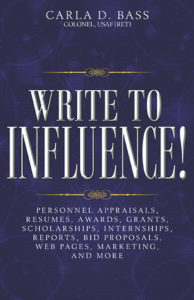INSIDE THE 
NEWS + ADVICE
Powerful Writing Results in Success
 Powerful writing changes lives. I’ve seen it. I’ve done it. Throughout my thirty years active duty in the Air Force and several years thereafter. Influential writing opens doors to promotion, fellowships, internships, scholarships, grants, career-broadening opportunities, competitive training, and so much more. In each of these, influential writing is key to success.
Powerful writing changes lives. I’ve seen it. I’ve done it. Throughout my thirty years active duty in the Air Force and several years thereafter. Influential writing opens doors to promotion, fellowships, internships, scholarships, grants, career-broadening opportunities, competitive training, and so much more. In each of these, influential writing is key to success.
Recognition for excellent writing skills can, in itself, present unique career opportunities. For example, consider this bullet from an annual performance appraisal,
“Jane is the best writer on my staff of 30. She is brilliant at translating technical jargon into concise, clear language. I rely on her exclusively to rewrite draft reports to Congress on a critical IT project. Her revisions ensure congressional staffs understand the status of the project, progress made, and upcoming goals–all fundamental to continued funding.”
On the flip side, you might be THE most qualified candidate—hands down—but if the competition is better at telling a story, you lose. I witnessed this as a squadron commander. Time and again squadron members were passed over for quarterly and annual awards, not because they were undeserving but because supervisors could not write compelling nomination packages.
The solution: I developed ten writing techniques, composed a handbook, transformed that into a 90 minute class, and taught my squadron how to write.
Results? You bet! The squadron metamorphosed from the most losing unit in all of AF Hawaii to the most winning, often sweeping the awards. In today’s vernacular, that handbook and the writing class went viral. I taught it to thousands of AF members for the next 15 years.
Now that we addressed the personal implications of influential writing, let’s consider it from an organizational perspective. Have you ever read a paragraph in a report, then read it again, and yet a third time, still unable to ascertain the author’s point? Of course, we all have! Wading through textual muck is time consuming, frustrating, counterproductive, and the bane of today’s business products.
As an employee or an employer, you are invested in the success of your organization. You must write well to help advance its goals and meet mission objectives. This includes writing clear, effective reports, responses to congressional queries, proposals for new programs, or papers to preclude cuts to budget and staff.
For job seekers, private business, corporations, non-government organizations, government agencies, and the military in particular, accurate, clear, and concise writing is the lifeblood for effective operations.
Influential writing is fundamental to:
- Finding a new career
- Building public support for an issue
- Attracting talented job applicants
- Publicizing an upcoming conference
- Selling products and services
 In each case, a well-crafted, hard-hitting, influential message often tips the scale in your favor. Marketing on the internet is another prime application. Not only are finely honed writing skills critical to the power of persuasion, they are also necessary to rapidly capture and retain the reader’s attention.
In each case, a well-crafted, hard-hitting, influential message often tips the scale in your favor. Marketing on the internet is another prime application. Not only are finely honed writing skills critical to the power of persuasion, they are also necessary to rapidly capture and retain the reader’s attention.
Writing skills are particularly relevant for those who:
- Rely on influential communication to grow business
- Employ a large staff, especially one geographically dispersed
- Deal with abstract ideas (e.g., analysis of social, economic, and political trends)
- Account to the public, to other institutions (e.g., Congress), and to history, and must explain and record their activities accordingly
- Face the possibility that an error caused by poor writing could be damaging either financially or to important national matters (Mortimer Goldstein, 1989)
Influential writing is also necessary for the scientific and technical communities. Why?
The decision to fund is often made by a committee whose members vary in expertise: administration, civil service, executives from a related industry, or a general background in science. To win, a proposal must speak to them all.
Program funding is often awarded to those whose proposals tell the most compelling story, with technical terms successfully translated into everyman’s language. The author must present a robust, logical argument in simple, understandable, and persuasive terms and conclude with a solution, preferably one that exudes, “problem solved.” So, you now ask, “How do I write like that?”
Power Writing
There are five principles to power writing:
- You have limited opportunity to make your case and influence the audience. Therefore, make every word and each second of the audience’s time play to your advantage.
- Empathize with the audience. Make your product easy to read, understandable, and unambiguous.
- Quantify and be as specific as needed to make your case. Ensure the product conveys the “so what” of the communication.
- Avoid jargon.
- Proofread! Presentation and administrative quality are paramount. Bad grammar, incorrect punctuation, and misspelled words lose the audience no matter how compelling the content.
Influential writing must consist of:
- A solid hook to grab the reader’s attention
- Crisp, focused text
- Solid, logical, fact-based information
- A message organized so that you lead the reader, without detour, from the beginning to conclusion of your message
How do you achieve that?
- Determine the goal of your communication and outline the approach to attain it
- Know your audience: its interests in and level of expertise with the material to be presented
- Write to respond to questions the product should answer; anticipate the audience’s questions and respond to those, as well
- Examine the draft from the perspective of the intended audience; adjust as necessary
- Consider the sequence of the material presented. Does if flow logically? Adjust as needed
- Showcase your strongest facts
- Tailor the message proportionally, based on allocated space
- Be objective in presenting the information
- Know how much information is enough and what not to include
Concluding recommendation: You spent years (and significant funds) establishing expertise in your chosen field. Spend a small fraction of that time to strengthen your writing skills to become more effective — and competitive — in that chosen field!

Carla D. Bass, Colonel, USAF, and author of “Write to Influence!” served 30 years active duty, working directly with general officers and civilian equivalents, ambassadors, congressional delegations, and foreign dignitaries. You can reach her at [email protected].
This entry was posted on Saturday, February 18, 2017 6:13 pm